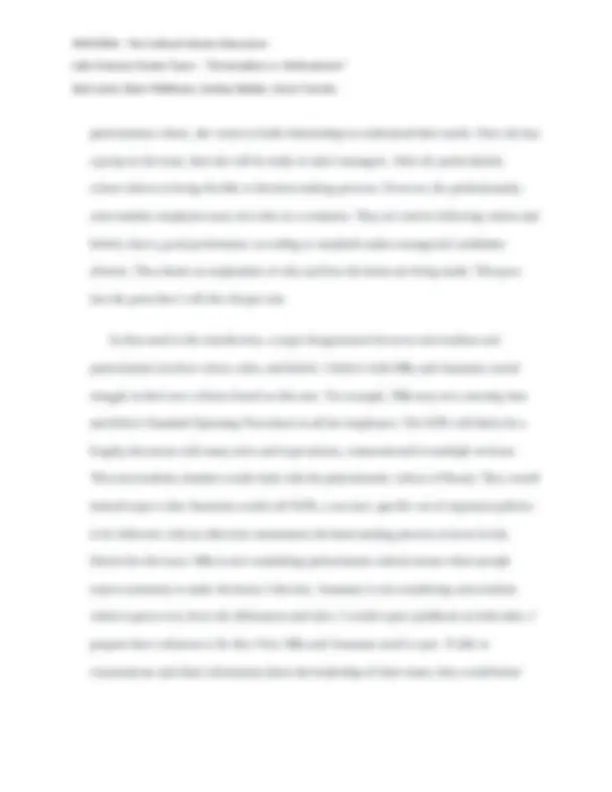





Study with the several resources on Docsity

Earn points by helping other students or get them with a premium plan


Prepare for your exams
Study with the several resources on Docsity

Earn points to download
Earn points by helping other students or get them with a premium plan
Community
Ask the community for help and clear up your study doubts
Discover the best universities in your country according to Docsity users
Free resources
Download our free guides on studying techniques, anxiety management strategies, and thesis advice from Docsity tutors
The contrasting cultural dimensions of universalism and particularism, highlighting their impact on leadership styles and decision-making processes. Using real-world examples and fictional scenarios, it analyzes the potential challenges and misunderstandings that can arise when individuals from different cultural backgrounds interact in a professional setting. The document emphasizes the importance of cultural awareness and sensitivity in navigating cross-cultural leadership dynamics.
Typology: Assignments
1 / 7

This page cannot be seen from the preview
Don't miss anything!




Latin America Cluster Team – “Universalism vs. Particularism” Zach Lewis, Ryan Matthews, Lindsay Stalder, Aaron Tversky Ten Culture Classics: Universalism vs Particularism
1. Explain your assigned dimension based on what you learned in the instructor’s videos and/or other sources. It may be helpful to imagine that you are teaching this concept to someone who has very little prior knowledge of this concept. Put simply, Universalism is the belief that a society has rules, laws, and values that are applicable to all members of the society equally while Particularism is the belief that relationships are more important to a society than any rules, laws, or values. To explain this better, let’s look at two scenarios and the possible reactions. An oft used example involves a car accident. Ryan takes one example of this and changed the scenario slightly. Picture yourself in a car being driven by your best friend. Your best friend crashes into another car, causing it to fall off a cliff. After realizing there are no witnesses, your best friend drives you both back home. You both know that the car cascaded off the cliff and there is no chance anyone in the other car survived. What is your reaction? Do you try to convince your best friend to turn themself in knowing what they did was wrong? Do you turn them in yourself? This line of thinking, common in America, is universalist. One the other hand, do you side with your friend, agreeing to never bring it up again? This is particularistic thinking. While this example is simplified, the comparison of universalism and particularism is not always so cut and dry. Another example, from an article on interculture competence/communication, revolves around marriage. Say your brother is marrying someone most of the family does not like or approve of. A universalist, more focused on telling the truth no matter what, expresses the family’s opinion, while a particularistic person cares more about cultivating the relationship and therefore would not share the information ( Manny Scott ).
Latin America Cluster Team – “Universalism vs. Particularism” Zach Lewis, Ryan Matthews, Lindsay Stalder, Aaron Tversky While these two examples cover the differing aspects, it is important to note that there is a spectrum between universalism and particularism. Many of us in this class likely lean towards universalism. This is because many countries of the West, such as the United States, Canada, Germany, the Netherlands, and Australia are universalistic countries. While they absolutely value relationships, they often tie relationships to values and beliefs. People gravitate towards similar minded people. Additionally, most of those countries have clear legal systems and democratically elected governments. Meanwhile, many Latin-American countries as well as Russia and China have less clear structure and often criticized elections. Their society revolves around who you know, in other words, connections and appointments to positions. For example, in Russia and China most high-ranking officials are strong advocates of the country’s leader and may even be related to them. These are all traits highlighting particularistic tendencies.
2. Consider two businesses, each of which exists in a culture that is sits on an “extreme end” of the spectrum represented by your dimension. Imagine two leaders were suddenly exchanged between these two businesses. For example, if your assigned dimension is “Individualism and Collectivism,” a leader from a country steeped in individualistic culture would suddenly find herself in a highly collectivistic country, while his “collectivist” colleague would find himself trying to lead in a highly individualistic culture. Make sure that all your examples deal with national ( not organizational ) culture differences. What misunderstandings and problems could arise for the leader suddenly immersed and expected to function in a new culture? Describe one such hypothetical cross-cultural problem in depth. You may answer in the abstract or create “stories” (give your characters names/particular job requirements/ personalities/dialogue/description of the situation and industry of the business) as you feel best addresses the issue. Creativity in use of examples is encouraged! For each problem, following your description of the problem, propose two potential solutions to improve the situation.
Latin America Cluster Team – “Universalism vs. Particularism” Zach Lewis, Ryan Matthews, Lindsay Stalder, Aaron Tversky particularism culture, she wants to build relationships to understand their needs. Once she has a grasp on the team, then she will be ready to select managers. After all, particularistic culture thrives in being flexible to decision making prowess. However, the predominantly universalistic employees may view this as a weakness. They are used to following values and beliefs; that is, good performance according to standards makes managerial candidates obvious. They desire an explanation of why and how decisions are being made. This goes into the point that I will dive deeper into. As discussed in the introduction, a major disagreement between universalism and particularism involves values, rules, and beliefs. I believe both Mila and Anastasia would struggle in their new cultures based on this area. For example, Mila may set a meeting time and deliver Standard Operating Procedures to all her employees. The SOPs will likely be a lengthy document with many rules and expectations, communicated in multiple sections. This universalistic mindset would clash with the particularistic culture of Russia. They would instead expect what Anastasia would call SOPs, a succinct, specific set of important policies to be followed, with an otherwise autonomous decision-making process at lower levels. Herein lies the issue: Mila is not considering particularism cultural norms where people expect autonomy to make decisions. Likewise, Anastasia is not considering universalism which expects very clear role delineation and rules. I would expect pushback on both sides. I propose three solutions to fix this. First, Mila and Anastasia need to sync. If able to communicate and share information about the leadership of their teams, they would better
Latin America Cluster Team – “Universalism vs. Particularism” Zach Lewis, Ryan Matthews, Lindsay Stalder, Aaron Tversky grasp the understandings of how to effectively lead. However, for the purpose of this example, let’s take that off the table. That leaves two other solutions. First, each leader needs to identify the strongholds of each office. That is, people that are proficient in their duties, but also respected in the office. Once identified, each leader needs to have an open, honest conversation about the new cultures they are in. This makeshift thinktank will help Mila and Anastasia develop tactics to execute in the new particularism and universalism paradigms, respectively. This will not only highlight the errors each has made, but also pave a path forward to right the ships. Second, they must try to embrace the new ideals. For Mila, she must try to highlight only the most important rules and trust her middle management with autonomy to lead. Anastasia must do the opposite and explain in detail the decision-making process she expects from her middle managers. This will be uncomfortable for both, but unless they jump into the new culture, they will not succeed in their new leadership roles for the tech company. Lindsay’s Example: Aaron’s Example:
3. In what ways might these theoretical categories for culture over-simplify a situation that might occur in the real world (perhaps your example)? These classical cultural dimensions are based on research and interpretation conducted in the past, in some cases decades ago, yet cultures never stop changing. To what extend do you think the dimension you assigned is still relevant today?
Latin America Cluster Team – “Universalism vs. Particularism” Zach Lewis, Ryan Matthews, Lindsay Stalder, Aaron Tversky teams. With a caution to not oversimplify, taking stock in different cultural ideals, including Americans studying particularism principles, this paradigm is important for self-growth and leadership development. Works Cited “How You Have Been Shaped: Universalism vs Particularism.” Manny Scott , 7 Feb. 2020, https://www.mannyscott.com/blog/how-you-have-been-shaped-universalism-vs- particularism. Wang, Jennifer. “Disappearing Billionaires: Jack Ma and Other Chinese Moguls Who Have Mysteriously Dropped off the Radar.” Forbes , Forbes Magazine, 8 Jan. 2021, https://www.forbes.com/sites/jenniferwang/2021/01/07/disappearing-billionaires-jack-ma- and-other-chinese-moguls-who-have-mysteriously-dropped-off-the-radar/? sh=5e0d3cb52187.